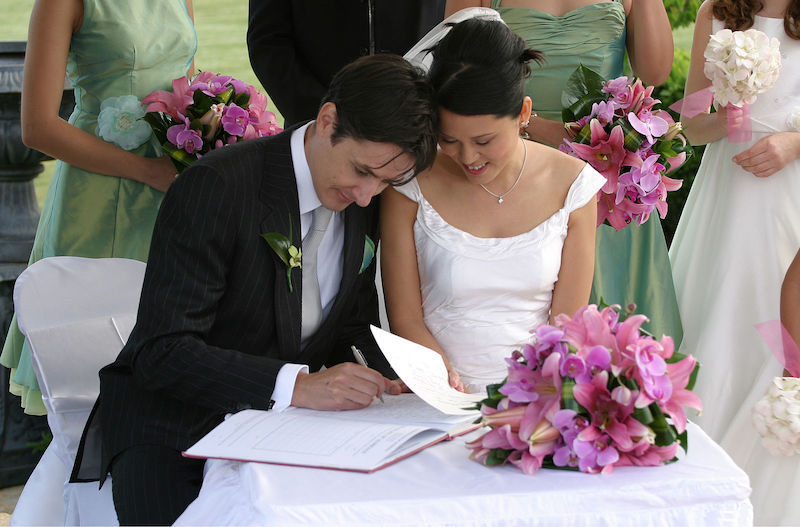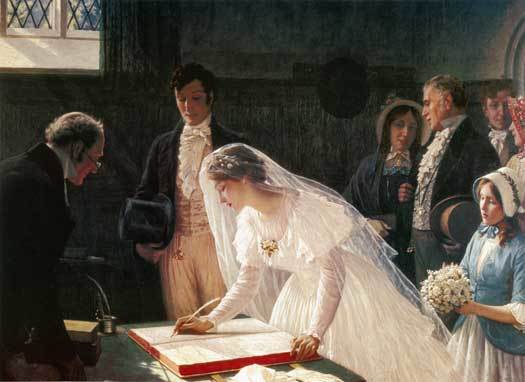AMERICAN WEDDINGS BLOG
Stay up to date with the latest wedding ceremony trends, script writing inspiration, tips and advice for first-time officiants, and news that matters to couples and wedding ministers.
Stay up to date with the latest wedding ceremony trends, script writing inspiration, tips and advice for first-time officiants, and news that matters to couples and wedding ministers.
Published Friday, Jan. 11th, 2019
Last updated Monday, Jan. 8th, 2024

Planning a wedding is an overwhelming task no matter how long or short the guest list is, but your wedding isn’t just about throwing a party. Marriage is a legal contract. This article explains what that means, and what you need to do to make sure you check all the necessary boxes.
We’ve all been to the DMV. We know that most interactions with government bureaucracy can be intimidating and/or frustrating. And although your wedding will be recognized by all states, many county clerks have different rules and requirements regarding the marriage license.
The marriage license is a document that authorizes a couple to get married during a certain length of time.
The marriage certificate is a document that proves a couple is married.
(And a ceremonial marriage certificate is a decorative keepsake with the names of the couple and their officiant. A ceremonial marriage certificate is not a legal document.)
Most states require the couple, the officiant, and sometimes a witness (or two) to sign the license after the ceremony is completed. That gets processed, and then the local government office issues you a marriage certificate.

Many states have a 'waiting period' between when a couple applies for a license and when it's issued, or between obtaining the license and performing the ceremony. This can be 24 to 72 hours, and sometimes even longer!
Once you have the license, you usually have a window of 30 to 60 days (sometimes even 90 days or longer) to perform the wedding, sign the license, and return it to your local government office.
If the license does expire before you get married, you can always apply for a new one, but that’s a pain in the ass (if you don't mind us saying so...), and there are often additional fees associated with the process.
Read Marriage License Waiting Period, Expiration, and Return to learn about waiting periods in your state.
Some offices require the couple to apply together, while others only require one person. No state allows someone to apply in your place, so give up on any plans to send your maid of honor, best man, or officiant to do the legwork.
No matter who plans on going to the clerk's office, check to see whether or not you can just walk in and apply or if something needs to be scheduled in advance -- because these office's often require an appointment.

You’ll need to bring some basic documentation. The couple will need official identification such as an original birth certificate, driver’s license, or passport.
If you're under 18 and applying for a wedding license, you must have permission of both parents. Some clerks require the parents to show up in person, others only require written statements. Inquire beforehand so you'll have the paperwork you'll need.
If one or both of the applicants is divorced, bring a copy of the final decree or the statement from judge.
If you watch old movies you might see them talking about getting a blood test before getting married. Don’t worry, almost every state has abandoned this step. Only couples getting married in Montana are still required to do so.
In short, plan ahead, bring ID and any necessary paperwork, and contact your county clerk with any questions!
Finally, we would be remiss if we didn't pitch our gorgeous ceremonial wedding certificates, available here in our store.
These artistically rendered documents are the perfect gift for the couple to commemorate their wedding and is perfect for framing, displaying, and passing on as a timeless heirloom.
Updated May 17, 2021
Become a Wedding Officiant with Our Free Online Ordination!